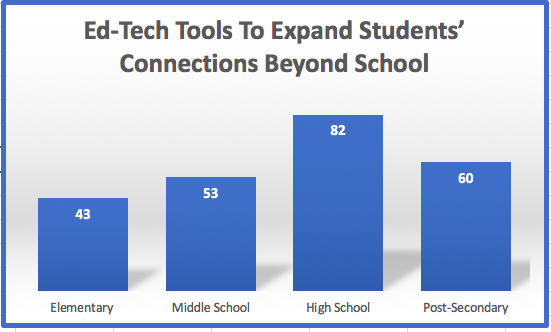New Site Connects Students With Ed-Tech for ‘Real World’ Expertise, Guidance
A new website called WhoYouKnow.org aims to help schools identify ed-tech tools that can link students to new relationships—with experts, mentors, and peers—who can help them academically, and with college and career planning.
The brainchild of Julia Freeland Fisher, the director of education at the Clayton Christensen Institute, the online resource is a free “market map” that lists 109 ed-tech tools designed to help educators and students broaden and diversify their networks for learning.
It is searchable for seven different categories of going outside school for expertise—from project-based learning to career coaching, from language learning to finding “real world relevance.”
Some of the tools curated in the collection can be used across different educational levels. The market analysis below identifies how many tools cater to students at various stages of their schooling. Fisher breaks down the tools’ target audiences as follows:

Fisher said she worked for three years on the research behind creating the website, inspired in part by the work of Stanford University professor Mark Granovetter. In his book, “Getting a Job: A Study of Contacts and Careers,” he found that at least 50 percent of jobs are filled through personal connections. Other studies put the percentage even higher. The “opportunity gap” this creates for students who can’t access these connections motivated Fisher to study where ed-tech can make a difference, she said.
The overall impact of the ambitious effort of WhoYouKnow.org on schools remains to be seen. Fisher said that the site is a pure research endeavor, self-funded by the Christensen Institute.
As they vetted which online resources to include in the directory, Fisher said she and her team used this question as a litmus test: “Is there a relationship on the other side of this [technology] that would otherwise be out of reach?” Many ed-tech tools have social features or functionality, she said, but they are not really tools that expand relationships or networks.
Fisher said entrepreneurs building the tools were also interviewed to find out, “What’s the value proposition they are bringing to schools?” Getting answers to that question allowed them to categorize different segments of the market where they saw relationship-expanding tools start to crop up.
How Schools Can Use the Site
Bringing the “real world” into the classroom for project-based learning is a goal of some of these tools, which pair students and their projects with industry experts who can provide context or feedback, Fisher said.
“It’s not the real world in quotes; it’s actually the real world,” she said.
Educurious is one example of a project-based learning tool that connects a global network of subject matter experts and mentors to students. And Community Share offers a model that allows adult volunteers in a local area to be connected with students.
To measure learning in this environment, “citizen assessment” is a form of direct feedback industry experts can provide, Fisher said. How project-based learning works with these ed-tech tools “is a pocket of the market I am really going to be watching in the coming year,” she said.
Another focus of ed-tech that connects is providing college access and guidance. With nearly 500 students for every guidance counselor, the advice students receive is limited, Fisher said, so ed-tech providers are seeking to provide students with mentoring or access to external resources in the area of college and careers.
Academic supports are another area where connections are being made online. “That could be as big as the tutoring market,” she said. “The piece I’m going to be paying more attention to is academic encouragement,” she said, which research shows can be highly effective. An example is Granny Cloud, in which adult volunteers provide “unconditional encouragement” via Skype to students as they struggle to learn.
Cautionary Note on Networking
Asked what users of this genre of ed-tech should be wary of—considering connections are being made between students and adults online—Fisher said the interactions must be approached with all the appropriate data privacy and security protections. “These tools are going through the same layers of security that most schools enforce around visitors,” she said, “as they should.”
For instance, a tool called ICouldBe, which focuses on mentoring for college and career readiness, provides fully virtual mentors who connect via text only because there are text filters to monitor the interactions. “They don’t use video chat because students are interacting online with an adult,” she said, “and you don’t want to use an [approach] that filters won’t be sophisticated enough to track.” Video chat tends to be used where an adult individual is interacting with an entire class, she said.
The other cautionary note Fisher identified was “around the measures of quality and outcomes we want these sorts of interactions and new connections to create,” she said. “Relationships are grounded in trust, not just logistics.” Fisher said, “We don’t actually typically measure trust between students and teachers, and community members or others who might be volunteering.”
Follow EdWeek Market Brief on Twitter @EdMarketBrief or connect with us on LinkedIn.
See also:

Wikipedia shows us the list of startups who start by the other organization. Every startup needs lots of money but as they are the startup they don’t have money so they have to get money from the other, get the wiki page service for the new organization and show the world what you have that others don’t